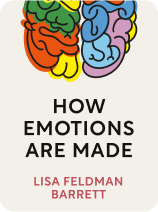

This article is an excerpt from the Shortform book guide to "How Emotions Are Made" by Lisa Feldman Barrett. Shortform has the world's best summaries and analyses of books you should be reading.
Like this article? Sign up for a free trial here.
Why can emotional stress make you sick? What’s the connection between emotion and illness? What are the long-term effects of emotional stress?
Most people recognize that having emotional stress is an unpleasant experience, however, not everyone realizes that it can actually make you sick. The author of How Emotions Are Made, Lisa Feldman Barrett, explains how emotional stress can make you sick, according to psychology and neuroscience.
Read on for Barrett’s explanation of why emotional stress can make you sick.
The Link Between Pain & Emotions
Myth: Illnesses such as anxiety, depression, chronic stress, and chronic pain are distinct problems with their own identifying features. They are unrelated to emotion.
Reality: The same systems in your body and brain that construct emotions also contribute to illness, argues Barrett. Just as your body budget is a key component of emotion, it is also a key component in creating pain and stress, and if it is chronically imbalanced, it can make you sick.
Your brain constructs pain and stress in the same way as emotion. However, this doesn’t mean that they are the same. It does mean that in all three, the interoceptive network issues predictions that descend along the same pathways from the brain to the body and ascend along the same pathways carrying sensory input from the body to the brain. In addition, all three relate to how emotional stress can make you sick and balancing your body budget (in other words, regulating your body’s physiological state). According to Barrett, illnesses such as anxiety, depression, chronic stress, and chronic pain are all rooted in imbalanced emotions and your body budget.
How does an imbalanced body budget cause illness? Barrett explains that normally, your body budget changes throughout the day as your brain anticipates your body’s needs and allocates resources accordingly. However, if your brain does a poor job of predicting your body’s needs, your body budget can get out of balance. For example, when something stressful occurs, your brain might anticipate that your body needs more energy than it actually does.
Long-Term Effects of Emotional Stress
If your body budget is repeatedly imbalanced, your body may release more cortisol than you need, causing inflammation to flare up. This emotional stress drains your energy and makes you more prone to getting sick, which in turn may cause you to sleep and eat poorly and exercise less. Finally, inflammation can cross from the body into the brain, and the brain can create it by itself. Inflammation in the brain causes changes in brain structure, particularly within the interoceptive network, which causes your body budget to be even more imbalanced. This can predispose you to disease.
(Shortform note: In When the Body Says No, physician and psychologist Gabor Maté also argues that chronic stress and illness are inextricably linked. Maté says that much of chronic stress is subconscious, so you don’t even realize you’re experiencing it. In fact, it’s often the people who believe themselves to be the least emotionally stressed who are at the highest risk of getting sick because suppressing negative emotions is precisely what can lead to illness.)
However, the link between pain, stress, and emotions may mean that you can decrease inflammation using some of the same techniques you would use to master your emotions. For example, by increasing your emotional granularity (ability to identify the specific emotion you’re feeling), you can help your brain calibrate your budget to your body’s needs. Studies show that people with higher emotional granularity go to the doctor and use medications less frequently, and spend fewer days hospitalized for illness.

———End of Preview———
Like what you just read? Read the rest of the world's best book summary and analysis of Lisa Feldman Barrett's "How Emotions Are Made" at Shortform.
Here's what you'll find in our full How Emotions Are Made summary:
- A deep dive into what emotions really are and where they come from
- How some cultures have different emotions than others
- The difference between feelings and emotions






